Review for Astro Boy
Introduction
Much as I love anime, I've become quite wary of Hollywood taking it on, apt as they are to remake foreign properties to turn a quick buck without expending any brain cells. I've also seen the emptiness of grand promises wasted again and again. James Cameron's Battle Angel Alita, Spielberg's Ghost In The Shell, DiCaprio's Akira, and Keanu doing Cowboy Bebop, all announcements designed to make anime fans go 'Woo!', but projects that remain in development hell, until they are lost from memory. Instead we have to make do with travesties like The Guyver, Streetfighter: The Movie and Dragonball Z. My retinas have refused to even let me watch the Speed Racer trailer, let alone the whole movie. So when the Hollywood adaptation of Astro Boy was announced, I approached it with no little scepticism.
After all, this is the original anime, the first post-war production that really put Japanese anime on the map, created by the godfather of anime himself, Osamu Tezuka. Astro Boy truly was a global phenomenon, as recognisable as Mickey Mouse, and just as ubiquitous. The manga was created in 1952, the first anime was made in 1963, and since then further series have been made on a regular basis. The most recent one, made in 2003 has even been shown on British television in the Saturday morning slot, so the market for a feature length Astro Boy movie is certainly ripe. But, it is a Hollywood CGI animation, and Hollywood CGI animations from companies like Pixar and Dreamworks all tend to follow a set formula, they tend to blur into one morass, a cute story for the kids, and plenty of pop culture references and quick fire gags for the grown ups. For Astro Boy's unique outlook to be subsumed into that gestalt would be worse than tragic. So, with my heart in my mouth, I placed the disc into the player…
The world of the future is a mess, polluted, barren, harsh and ugly. Fortunately for the residents of the futuristic Metro City, that isn't a concern, as their paradise has been lifted up from the ruins of Earth, and now floats aloof in the sky, its residents living perfect, idyllic lives in peace and tranquillity. That's all down to the miracle of robots, as machines now serve Man's every need, and it's all down to the best robotics engineer of them all, Dr Tenma. But the world isn't perfect yet, there still exists war, there still exists power, and the lust for it, and there still exists grief and loss. In his grief and loss, and perhaps a moment of insanity, Dr Tenma created a robot to take the place of his son Toby, who had died in an industrial accident. But it didn't take long for Tenma to realise that Astro was no true replacement for his son, even if he had his memories and his likeness, and Astro was left to fend for himself on the surface of the Earth, now a barren junk heap full of discarded robots from Metro City, where the underclass of the world, both humans and robots now live. Abandoned and alone, Astro has to find his place in the world.
There's still that lust for power, which is where President Stone of Metro City comes in. He's up for re-election, and he needs something to boost his approval ratings. He needs some sort of military triumph, and has with Tenma's help created a 'Peacekeeper' robot to win the next war, as soon as he can find someone left to declare war upon. But the peacekeeper needs an ultimate power source, and it's Doctor Elefun, one of Tenma's associates, that has discovered positive Blue Core Energy, extracted from a fragment of a star. That power is practically infinite, and can be used for the ultimate good. Stone wants this power for the peacekeeper, but the problem is that it's currently powering Astro on the surface below. And the last thing that anyone wants is for Stone to use the negative Red Core Energy in his robot.
Picture
Astro Boy gets a 2.35:1 anamorphic transfer. At this point in the DVD cycle, it's a hard slog even coming up with a nitpick about a film transfer onto DVD, especially if it's a CGI animation like Astro Boy. I can really only point at the minor aliasing issues that indicate the limit of the DVD format as a possible niggle. Fortunately, the Blu-ray is released on the same day (in a Blu-ray DVD combo for the best of both worlds), and you can have an even better image if you choose. Astro Boy's animation is a little quirky, a shade removed from the intricate detail of the Pixar films, with smoother textures and somewhat caricatured character designs, not quite faithful to the Tezuka originals, but not altogether blending into the Hollywood CGI way of doing things. If I could hazard a comparison, it reminds me of the Aardman animations, with a sculpted feel to the characters and the world, that wouldn't be out of place in a Wallace and Gromit movie. It's no surprise then that director David Bowers also helmed Flushed Away.
Sound
The DD 5.1 English track is pleasant enough, bringing across all the action and excitement, as the film requires. The music is nice, but hardly memorable, which is surprising given that the main theme is played to death over the main menu. The dialogue is clear throughout, and English Hard of Hearing subtitles are supplied if you need them, although only for the main feature.
Extras
Astro Boy gets animated menus that suit the movie just as you would expect, and the disc autoplays with trailers for Letters to Juliet, and Furry Vengeance.
There is the usual collection of EPK featurettes to enjoy, with Inside The Recording Booth (10 mins), giving a chance to see the actors at work, while delivering a few soundbites to camera. Designing A Hero (10 mins) and Building Metro City (7 mins) lets us see the pixellators do their stuff. The Astro Boy Image Gallery lasts 5 minutes and looks at Astro Boy through history, some promo imagery and character designs.
Getting the Astro Boy Look gives 3 minutes of frivolity, as plenty of hairgel is used to recreate Astro's spikes on several willing subjects.
Of most interest are the 2 Astro Boy Short features, which offer mini stories with the movie's characters. Astro vs. The Junkyard Pirates lasts 3 minutes, and The RRF In: The New Recruit lasts just 1 minute.
Conclusion
It wasn't a promising start. The opening credits sequence takes us speeding down a swirling cloudy vortex, just like the Doctor Who opening credits. The text looks like it uses the Star Trek movie font, and I thought that if the opening credits are this derivative, what must the rest of the film be like? But Astro Boy turned out to be quite an enjoyable film, if not altogether certain of its identity. This is a film that tries to straddle both East and West, staying true to Osamu Tezuka's legacy, while at the same time giving us the pixellated comic stylings of the majority of CG movies made in Hollywood today. It results in a film that is a little wavering of tone, unsure of focus, and doesn't even reach the frivolous jocularity of Dreamworks, let alone the emotional heights of the best of Pixar. On the other hand, it does avoid the mediocrity and stylistic morass of most Western CG animations, and it does carry enough of its original legacy with it to make it stand out from the crowd.
For those who expect the wisecracking characters, the visual gags, and the pop culture references of the majority of CG animations, it is all there, but not quite in the overload that I've come to expect from such movies. Nods and winks to the audience are comparatively rare, the visual gags are present and correct, and they do serve their purpose, but at no point are they allowed precedence over the narrative. As for the smart mouthed wit, well you can't get rid of everything. Also, while Astro Boy does have a star studded cast, boasting Nicolas Cage, Samuel L. Jackson, Nathan Lane, Donald Sutherland, Matt Lucas, Bill Nighy and Charlize Theron among the luminaries taking part, there's no stunt casting. There's no Jonathan Ross cast as baggage handling droid five, no Vanessa Feltz as random cameo #9, which is a practice that has turned me off from many an animation. All the actors here are actors, and they suit their roles down to a T… almost.
There are new elements in this version of Astro Boy, the utopia of Metro City floating over the devastated Earth, the Blue and Red Core Energy, and President Stone's lust for power that may seem removed from the original. But I feel that with environmentalism so ingrained in modern society, it's a realistic adaptation to create a polluted Earth to add to the message of the story. Also, the division between the two worlds, the shiny, new utopia above, and the second class citizens and rejected robots below could easily belong in Tezuka's Metropolis. The satire of a President engineering a war to retain political power must be too sweet to miss up, but you can also see such political aspects in Tezuka's manga as well, it feels very true to the property.
But it still is that futuristic Pinocchio tale at heart, with Tenma the scientist Gepetto, and Astro the Pinocchio with rocket boots. The movie's tragic heart is the grieving scientist trying to recreate his dead son, and when the realisation of his folly eventually arrives, he rejects that replacement. Astro has to go on a journey of self-discovery, to face adversity and discover his place in the world, and only that way will he be able to reconnect with his 'father'. As in all such films, it's the villains who have the meatiest roles, and Nathan Lane certainly hams it up as Hamegg, the surface dwelling ringmaster who resurrects robots for a living, although not for any benevolent purpose. He's a deceptive character, having gathered an orphanage of children around him to find promising pieces of robot junk in the rubbish dumps that comprise the surface world, and for a while it's as if Astro has found that father figure that is lacking in his life. Another juicy role is that of President Stone, played with gusto by Donald Sutherland, and he chews the digital scenery, creating a lively, power mad, despot who is completely unlike any real world leader at all, honestly.
But where the film falls down is in the most important role, the most important relationship of all, that of Doctor Tenma and his son and later with his creation. Nicolas Cage as Tenma seems distant and distracted, never quite inhabiting his character's boots. Of course that isn't helped by a script that slightly insults the viewer's intelligence, assuming that children cannot handle the concept of death. So it is that Toby's death is never acknowledged as such, he's merely 'gone', and Tenma's reaction to the death of his son feels cold and unrealistic. The implication is that by using Toby's DNA in the construction of Astro, it is in someway bringing Toby back from wherever he 'went', and while Tenma eventually acknowledges that is false, the film doesn't go out of its way to reinforce that fact for the viewer. It's a wishy-washy and non-committal approach to what should be the heart of the film, the whole point of the story, which really lets the film down.
Astro Boy is fun for much of the run time. It's just the weak execution of the premise that hampers it. The middle is good, but the beginning is lax, and the end is quite frankly ridiculous, obviously fishing for a sequel. It's ironic really, given that Astro Boy almost dealt studio Imagi a fatal blow to its finances.
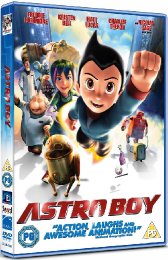

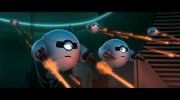

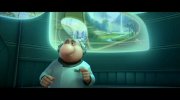
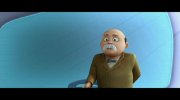
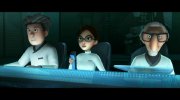
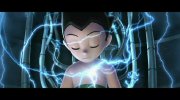
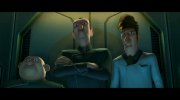
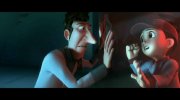
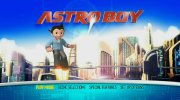

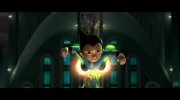
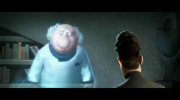
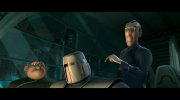
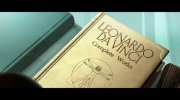
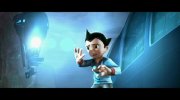
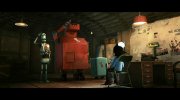
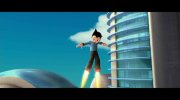
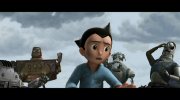

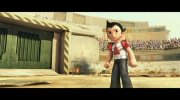
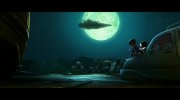

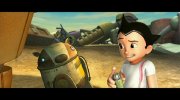
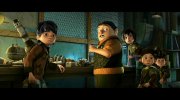

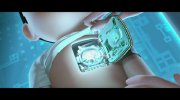
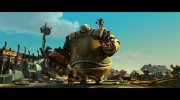
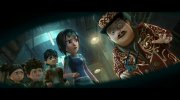
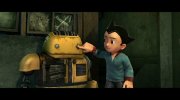












































Your Opinions and Comments
Be the first to post a comment!